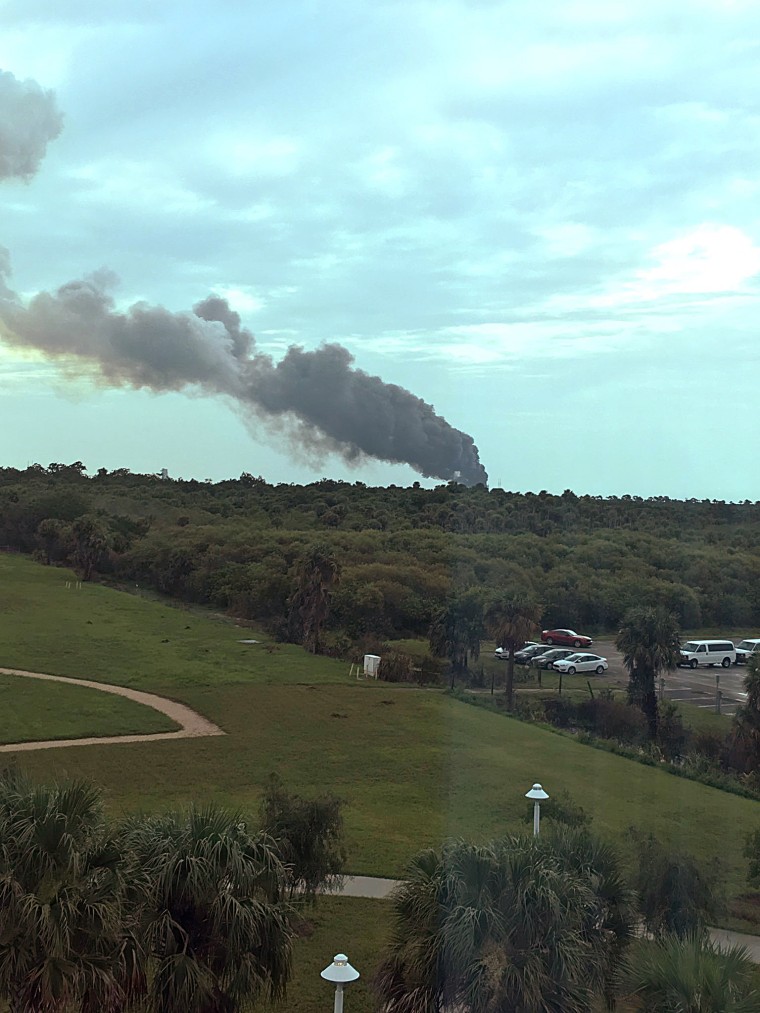A SpaceX rocket exploded on the launchpad this morning in Cape Canaveral, Florida, destroying the rocket and a communications satellite that had been set to help Facebook deliver internet service to parts of Sub-Saharan Africa.
Facebook CEO Mark Zuckerberg, who is in Africa this week visiting government leaders, developers and entrepreneurs, posted he is "deeply disappointed to hear that SpaceX's launch failure destroyed our satellite that would have provided connectivity to so many entrepreneurs and everyone else across the continent."
The accident took place during a routine test that happens before every launch. SpaceX conducts static fire tests of a rocket’s engines before every launch to ensure everything is running smoothly.
"SpaceX can confirm that in preparation for today's static fire, there was an anomaly on the pad resulting in the loss of the vehicle and its payload. Per standard procedure, the pad was clear and there were no injuries,” SpaceX spokesman Phil Larson told NBC News.
SpaceX CEO Elon Musk tweeted the cause of the explosion was still unknown.
Multiple explosions rocked the test site at Space Launch Complex 40 at the Kennedy Space Center and sent billowing plumes of smoke into the atmosphere.
The launch, which had been scheduled for Saturday morning, would have been the ninth for SpaceX this year.
Amos 6 belongs to satellite operator Spacecom and was supposed to add to the communications services being offered by the company's older satellites. Facebook had leased Ka band beams on the satellite, which would deliver internet access, but did not own it.
NASA spokesman Al Feinberg said emergency personnel were monitoring the situation and standing by to assist, and the air quality was being monitored for any potential threats to employees.
Despite the setback, Zuckerberg pledged to "keep working until everyone has the opportunities this satellite would have provided."
"Fortunately, we have developed other technologies like Aquila [Facebook's internet drone] that will connect people as well," he wrote.
The explosion happened during a banner year for Space X: It landed its first rocket in December and has landed five more since then. The company announced earlier this week it would launch its first recycled rocket with a paying customer, Luxembourg-based satellite operator SES, before the end of the year.
Elon Musk, the CEO of SpaceX, has said he believes reusing rockets — which cost as much as a commercial airliner — could greatly reduce the cost of getting to space.
SpaceX suffered its biggest setback to date in June 2015 when its Dragon vessel exploded shortly after taking off on a NASA-contracted cargo run to the International Space Station, destroying thousands of pounds of cargo.
SpaceX resumed its NASA missions last April. The company also has a contract with NASA to carry astronauts to the International Space Station on board its Crew Dragon, a voyage that could happen as early as 2018.
Musk founded SpaceX in 2002 with the goal of revolutionizing space technology and exploration, including his "ultimate goal" to allow humanity to become a multi-planetary society.
The billionaire announced in April SpaceX plans to send an unmanned Dragon spacecraft on a test flight to Mars as early as 2018.
NASA will offer SpaceX technical support for the mission, including access to the Deep Space Network, in exchange for data on Martian entry, descent and landing, according to a blog post from Deputy Administrator Dava Newman.

